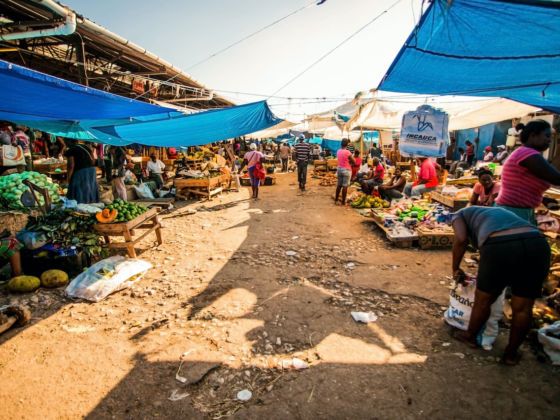The craft market, under a blue tarp at the back of the produce market, was easy to miss because, like everything else in Jamaica, there was no sign. An old woman with blurry eyes and cropped white hair sat behind a table that was scattered with refrigerator magnets, shot glasses, key chains, and Rasta hats — red, yellow, and green. She waved her hand over her wares like a magician and then called to me, asking, “Are you a travel agent?”


Bargaining, or the Third Stage of Grief, in Port Antonio, Jamaica
I laughed. “No, do I look like one?”
She folded her hands over her belly and said, “I’ve been watching you and was admiring the way you wrote notes.” She pointed to the journal in my hands. “You need another pen?’ she showed me the pens on her table.
“I’m not a travel agent,” I said. “I’m a writer. Or at least trying to be.”
“Oh,” she nodded, “then you do need a pen!”
“I have a pen.”
Then she nodded and said, “But you look like a travel agent.”
“Thanks,” I said because looking like a travel agent seemed like a compliment, though I couldn’t say why. I knew, though, I was really just another tourist, someone who might spend a few dollars on a Rasta pen or Bob Marley shot glass.
I introduced myself, and she told me she was Kathleen Henry. “Nice to meet you,” I said, and we shook hands. She told me that she was 78 years old and that her photograph was in the Norman Manley International Airport in Kingston. Because she was trying so hard to sell her items, I asked her if she was paid for the photograph. She shook her head, and I said, “Selling the rights to your image might make you a lot more money than selling your wares.”
I could tell that she wondered if maybe she ought to have been paid. I hadn’t meant to upset her, so I told her that when I left Kingston, I would look for her photograph. She smiled.
I was traveling to Jamaica for work, teaching a travel writing class. I had taken my students on a field trip to the town of Port Antonio and given them a scavenger hunt of activities designed to help them get a story. I suggested they walk around alone. None of them did this — choosing instead to explore the town in small groups — except for me. I wanted to be on my own, but I was too distracted to do their assignment myself. I mostly just wandered around, trying to pay attention to things — stray dogs following a man who fed them, the smell of jerk chicken, the vendors selling sugar cane or coconuts that they would retrieve by climbing into the trees.
I also wanted to bring a gift home from Jamaica for my mother, something useful. We were between chemotherapy treatments. She had been given three months to live back in October. Now it was January.
I fingered a green, yellow, and red knit cap. “Rasta colors,” Kathleen said. “Fifteen dollars.”
I nodded and then said, “My mom is 78, too. I’m thinking of buying this hat for her.”
“Ten,” she said.
And I hadn’t meant to, but I told Kathleen that I wanted the hat because my mother no longer had her hair. When she looked at me in a strange way, my voice turned to scratch and squeak, but I managed to say, “Because chemotherapy.”
I wanted to tell Kathleen that I didn’t want to bargain, that that wasn’t why I was telling her this, but saying so would have sent me into full cry. So I just put the hat back on the table.
Kathleen Henry took a long look at me, and all I could offer her was a weak smile, and I said, “I’m sorry.”
The way she looked at me, I believed that she really saw me, or maybe it was just that caught in her gaze, I finally saw myself, and the reckoning of my grief. I started to cry, wiping the tears away with the back of my hand as soon as they came. I apologized again, but she looked at me in that way that said it was okay. I hoped my students wouldn’t wander into the market then, see their teacher there, crying.
Kathleen put the hat in a plastic bag, looked around so nobody would see, and handed me the bag.
I pulled out my money, and she looked at it. I didn’t want the hat for free. I didn’t want to cry. I didn’t know what to do. I held three fives, and Kathleen Harris took one of them and said, “I hope your mother gets better” and then “I’m very sorry.”
I walked out from the dark canopy and into the light, no longer just a tourist, but a woman who was losing her mother.